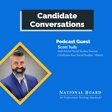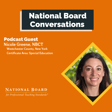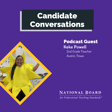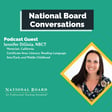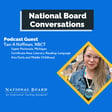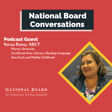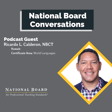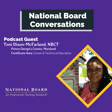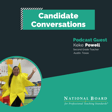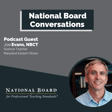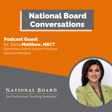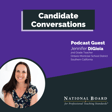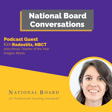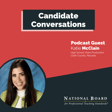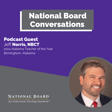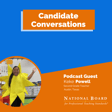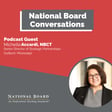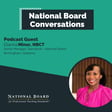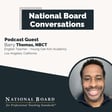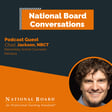Become a Creator today!Start creating today - Share your story with the world!
Start for free
00:00:00
00:00:01

Kathryn Logue, NBCT - Special Services Director - Coulee Dam, Washington
On this episode of National Board Conversations we celebrate Native American Heritage Month by speaking with Kathryn Logue, NBCT! We wanted to hear the perspective of a Native American NBCT, and that is what we did! She is the Special Services Director in Coulee Dam, Washington.
Twitter: @NBPTS
Instagram: @NBPTS
Facebook: The National Board for Professional Teaching Standards
Transcript
Introduction & Guest Background
00:00:00
Speaker
What's going on everyone? Welcome to another episode of National Board Conversations. It is Native American Heritage Month and I wanted to talk to a Native American NBCT and get their perspective on the process and much more. So on this episode I speak with Catherine Loew. I had never had a Native American teacher.
00:00:15
Speaker
as a student growing up. She's a national board certified teacher on the reservation out in Washington state. We get into why she originally left the reservation and then came back discuss how she is able to weave her traditions in the classroom and much more. It was a conversation that pulled on my heartstrings. Here's Captain Loeb. Captain Loeb, thank you for joining me on the podcast. It's so much to have you. I'm so excited to be here.
00:00:42
Speaker
All right, so we'll get right into it. Can you give us your current role and give a brief intro yourself? Then I got a few questions for you. Sure. A little bit more on the personal side. Sure. My name is Catherine Loge. I am the special ed director for my school district right now. I have been in education for about 19 years now and I've done the national board process twice and very excited about that. I have taught.
00:01:09
Speaker
fifth grade, I have taught special ed, I've been an autism specialist. So I've kind of done a little bit of everything and born and raised on the Colville Confederated Tribes Reservation. I have a daughter who is 12 who is also an enrolled member. I'm living back on my reservation. I'm very excited about that. I've been living here for probably about seven years now. So that's kind of my quick down and dirty intro.
00:01:38
Speaker
So it's very timely to have you during Indigenous Heritage Month. So given that, what are your three favorite
Catherine's Personal Interests
00:01:44
Speaker
foods? My three favorite foods, okay. They're probably all carbs, but I like bread. I like lasagna. And I really love, my mom makes this white chicken chili that I am totally obsessed with and will eat it three times a day if she makes it. So I really love it.
00:02:05
Speaker
Oh man, you're going to have to get a recipe. I know. I have. It's not as good. There's something about what, I don't know. She's got some mama magic or something. I can't, I can't replicate, but it's always special. Yeah. I think she hides things for me. So I'll come by and visit, which is also pretty awesome. So, all right. So the last three songs on your music playlist. Okay. The last three songs on my music playlist are, um,
00:02:34
Speaker
I can't remember it actually I don't I we listen to a lot of traditional music at my house so we have you know the drum group Northern Cree I really like them and we have some Randy Edwards who's an excellent percussionist and so we've been listening to a lot of that this whole
00:02:55
Speaker
summer, month, it just kind of gets me going. I used to dance. I was a jingle dancer. I enjoy listening to music like that. It really kind of centers me. My daughter really enjoys it. And it's a total 100% part of our home life. So we do listen to the radio, but we just enjoy
00:03:17
Speaker
We enjoy listening to drum music. Like I said, it kind of brings us back, re-centers us, and makes us feel cool, calm, collected, and we really like that. That's awesome. The educators want a little bit of music from the... So, all right. The one sports team that has your heart, and if you're not a sports fan, the movie, you can recite Line for Line.
00:03:37
Speaker
OK, so I have two sports teams that I'm just totally into. Of course, we're Seattle Seahawks people. If you enjoy them, then they could be doing a little better. But we're fans nonetheless. And we're definitely into the Washington State University Cougars. So we're all about those two teams.
00:03:58
Speaker
We used to be season ticket holders to the Cougars and we just we watch them any chance. All their sports anytime we can so awesome. I like they quarterback. They got up there. Yeah, yeah, pretty awesome. Pretty awesome. Want him to stay so yeah, I'm pretty excited.
Journey to Teaching & Role Models
00:04:17
Speaker
Alright, so can you share why you became a teacher and remain connected to education?
00:04:21
Speaker
Yes, so more than a few years ago, I actually was going, my dad is a forester and most of my family are in natural resources, wildland, firefighting. I spent all of my high school time working in forestry as an intern.
00:04:40
Speaker
and really enjoyed it. But when I got to college, I realized really quickly that I didn't enjoy all of the coursework. It just didn't speak to me. And I realized that I liked the work, but not the coursework. So I took some time out of college and ended up becoming a reading tutor for Nespilum Elementary and loved it, loved everything about it, loved. And that's the school I went to for elementary school. So
00:05:08
Speaker
I loved it. I loved connecting with the kids. I loved being their tutor and that actually got me started on this. Maybe I want to be a teacher. I always have had a lot of respect for teachers and the thing that I love the most about teachers is they seem like they are
00:05:24
Speaker
constantly learning. They're always reading books. They're always curious about things, and I find that to be pretty central to my own nature. So I started to go to school, and then once I got into school, I realized that I kind of had a passion for special ed.
00:05:42
Speaker
and elementary ed and I wanted a way that I could do both. So I got a dual endorsement from Eastern Washington University and was lucky enough when I graduated to be, I didn't have to sub for a long time. I actually graduated in February and I got picked up for a job in Colfax, Washington, probably in March and stayed there
00:06:07
Speaker
Yeah, and stayed there for, you know, five, six years, and it was great. So that was really why I became a teacher. I don't have a lot of teachers in my family, but the other inspiration, once I really got going into my classwork, was that I had never had a Native American teacher as a student growing up.
00:06:28
Speaker
And I had very dedicated teachers, especially in my elementary school. They came every day. They inspired me. They wanted me to look beyond barriers. And I have a family that really supports education.
00:06:43
Speaker
But that was the one missing link for me is not having a face that looked like my own. So that really, really inspired me to, number one, get my education. But number two, find a way that I could return back to my own reservation so that I could be that person that I look like you, I talk like you, I know your family. I know we see each other at traditional
00:07:07
Speaker
gatherings. I mean, I really wanted to be that fully connected person because I feel like this community has given me a lot. When you go out, I have come from a large family, so when you go out in public, I was always raised that anybody could talk to you.
00:07:24
Speaker
anybody could tell you that you're not doing the right thing. And I really took that to heart. And I had a lot of people who shared a lot of good conversations with me and always looked out for me. And I feel like this part of my life is about giving part of that back and trying to enhance the community that really gave me a lot. So that's kind of my roundabout, but that's really why I like to be in education.
Impact of Indigenous Heritage on Teaching
00:07:50
Speaker
Now, it's awesome to hear and having that
00:07:53
Speaker
teacher that looks like you, it just connects in a different way. I talked to a lot of friends about the first time I had a black teacher and it just changed everything for me. It just changed my whole outlook on who I could be. It was great. It's awesome to hear that you want to be that person for other indigenous children on your reservation. That's really awesome. So how has your indigenous heritage influenced your teaching philosophy and practices?
00:08:21
Speaker
Well, you know, we grew up, I grew up in the seven drum religion. And that is, you know, basically, we're really connected to the earth and creator. And we have seasons in our lives, you know, we're in the fall winter season. So this is when we tell our stories and things like that when things have slowed down. And I really feel like, you know, our history is oral.
00:08:45
Speaker
And so for me as a teacher, I'm a very oral person. I like to speak about myself. I like to speak life into other things. And I feel like as educators, that's what we're doing every single day is we're speaking life into our students and to their learning. It isn't just a situation where we get out here to workbooks and we're going to do page
00:09:10
Speaker
five to six or whatever. And then we're going to move on. We have a lot of relationships that we're developing all the time and fixing and repairing. And that was definitely part of my culture growing up that we have respect for ourselves. We have respect for our earth. We respect our teachings. We respect our elders. And we're always constantly learning something. I'm actually not even considered an elder in my family. They still call us kids.
00:09:41
Speaker
And I think that's a good way to think about things, though. It's that constant learning part of us. It's how we're raised to be that we're just, you know.
00:09:50
Speaker
we're not actually elders till we pass over to the other side in a lot of ways. And it's because we're constantly learning, we're constantly evolving, and that's the way we should be. But we're supposed to be doing it with kindness and compassion. And I really have tried to remember that every time I walked into this school that I leave
00:10:11
Speaker
I leave whatever I have on my mind and my heart behind because I'm touching a lot of minds and hearts going forward and I want to keep that in my front view at all times because you really can make a difference by doing something small and small seeds can be planted all the time and it's just really important to remember that. So that's part of my culture that really comes into play for me almost every day here.
00:10:38
Speaker
Powerful stuff. You got me here again. Real introspective and you're not in the garage room anymore. Why'd you leave?
Transition to Special Ed Director Role
00:10:48
Speaker
I left because, you know, actually I didn't leave in a bad way. I really, it was an opportunity because during the pandemic, our special ed director who had been here for several years was transitioning out. And we really didn't have a special ed director for almost a year and a half. And when this opportunity came open, I just thought, you know, maybe it would be time for me. Maybe there's a reason.
00:11:15
Speaker
I really loved my classroom job, but I really wanted to have this bigger picture view and I wanted to, I'm all about services. So, you know, I'm definitely one of these people that not perfect, but I want to leave you better than you, than you came at me. Right. And that was kind of my whole goal with being a special education teacher. So I left my fifth grade classroom and my co-teacher that I loved very much and decided to take on this bigger challenge because I wanted to see if I could reach
00:11:44
Speaker
More people and to continue, you know, we just have some excellent teachers here and I really wanted to see if we could if I could continue just just furthering that that label of excellence and those great services that I had been seeing and kind of take a different dynamic approach. We really need to have more community members.
00:12:04
Speaker
Involved in our school and I wanted to see a lot more native families being more comfortable coming in the door especially if they like I said see a face that they know and see a see a person that they recognize and so That was my bigger goal and so far year two it's been it's been a really exciting experience It's totally different from teaching and I and I wouldn't be lying if I said that I miss teaching a lot so I do
00:12:34
Speaker
try to stay pretty visible with kids and I get out in the hallways and things like that because I do miss that interaction. There's just something, adults are awesome, but there's something more powerful about being around kids and kind of hearing their stories and what they did on the weekend and going to their games and just kind of being part of that whole thing is just, it's really powerful. So I try not to miss out on that too much.
00:12:56
Speaker
That's awesome.
National Board Certification Journey
00:12:58
Speaker
So while you were in the classroom, you pursued national board certification, national board certified. That's why you're here. That's why we're here. That's why we're here. That's why we're here. First year to pursue national board certification. What was your journey like? Did you achieve on your first try?
00:13:10
Speaker
Yes, I achieved on my first try. It was really interesting because I was actually moving between two districts. My husband moved and kind of was like, well, I guess you got to move too because it's almost two hours away from your school. And I kind of had it all set up in my mind. So I had to redo my game.
00:13:32
Speaker
I was living in the house in the basement because we bought a house that we had to redo and pretty much punching out all of my national board stuff. And I was an autism specialist. It was a job I never had had before. So it was a really unique challenge. But I actually really appreciated that because, number one, I had an excellent staff to work with. But number two, it just helped me. I really think it helped me to really get to know my students
00:14:02
Speaker
way more in a shorter time frame. I spent a lot of time with them anyways as a teacher but just to really reflect on what I was doing and my practice and things like that. It really honed that in for me and I think it made my time in my school district that I was working for much better because like I said it was just when you're doing that process it's really intense and the reflective part of it is really intense and
00:14:29
Speaker
And I think that it just, it just helped me to develop relationships and it really was a game changer for me. So I appreciated, but it was a lot, it was hard. It was pretty intense for me. Like I said, I use that word frequently, but that's like the best word I can use to describe the process. It's intense and it's intentional. I guess you can, you're really going for some very focused things. So it was, it was a great process though.
00:14:57
Speaker
And I bet it, like you said, it helped you build those relationships with your students. You were transitioning districts in the middle of the school year. So you were going to have to build that relationship anyway. So like you said, it helped accelerate that process for you.
00:15:09
Speaker
Yep, it totally did. It totally did. And then, like I said, getting to know the staff. I mean, it was just that whole, it was really, really focused. I really had to start hitting the ground running as soon as I got in there day one. And it was just, it was really fulfilling. Plus, you know, the nice thing was I actually had other teachers, I had two other teachers in my district that were doing it. So we ended up being in the same cohort.
00:15:33
Speaker
They weren't special ed teachers, but it was a great way for me to just get to know them. We were having dinner at each other's house and we were doing things so we could just kind of get through these assignments and have other people look at them and things like that. So it was really awesome. It was a great thing for me. Yeah. We like to tell people it's better to go through it with a partner. So it's nice to hear that you were able to develop that in your cohort when you was moving.
00:15:58
Speaker
Yeah. And actually my second time through those same people were doing it too. So I actually saw them at a few because the second time through you don't have as many, um, directed cohorts, but you do have some activities that you can do. And I actually saw them a couple of times and we did end up working on a few things together just to make sure. So it was great. They're kind of like lifelong relationships that I've had just going through that process. So it's pretty awesome. That's really cool.
00:16:26
Speaker
So what was the most helpful coaching conversation, resource, or piece of advice you received while you were going through the process?
00:16:33
Speaker
The most helpful thing that I got going through that process was that, you know, it's self-reflection. That's really the big thing about National Board is it isn't necessarily about trying to make the grade. It's about reflecting and constantly reflecting and getting into that practice. So giving yourself grace that that first lesson isn't going to go
00:16:58
Speaker
as well as you thought or that video because I actually had a video that I tried to do about four times because I had a kid with autism who kept knocking the camera over and and it was just it was it was a challenge but just giving yourself that grace in that space and realizing that you know this is helping you to grow when I
00:17:17
Speaker
had that conversation in my cohort because to me, in my mind, you know, just being four years out of college at the time, I was still in that college mindset that I'm going for some grade, that I'm trying to meet some unseen level, but actually the level is yours. You're really trying to reflect on your own practice and show all of those improvements and show that journey. And I think that was the best
00:17:44
Speaker
the best advice I got that it was a journey that we are striving for excellence, but it's all about your practice and having those improvements and those journeys and your own practice and reflecting those. So I think that really took a lot of the pressure off of me to feel like, is this an A level paper? I mean, it really took a lot of pressure off of me. So how do you think the National Board process can help educators develop
Integrating Cultural Competency & Empowering Students
00:18:13
Speaker
the correct cultural competency when engaging Indigenous students in their communities. Because we know that a majority of schoolteachers are not teachers of color.
00:18:24
Speaker
Nope, nope. I think that it would be nice to see some more cultural competency type of activities in National Board because I feel like teachers are already reflecting. But I think that you have one part that's like a community engagement and it would be sort of nice to see that turn into more of a cultural relevance because our communities are
00:18:48
Speaker
You have African American students. When I did my first round, it was an African American student and Hispanic student. I mean, just all of these, not just native people, but they just have all these different cultures. And I like the reflective practice, but part of being part of that community is sort of knowing, you know,
00:19:06
Speaker
What it I was in a class and everyone said every every community has their own sacred cow you know mean that you cannot touch type of thing and I think it would be nice if we could reflect a little bit more on that and personally on our students and they do that a little bit and I think it's great but I think it would be nice if it were more intentional because we do have
00:19:27
Speaker
you know, we're talking more about that. Even at my school, we're talking more about our traditions and our languages, but we also have non-native students who have traditions and different things in their family. So how do we encompass all of those? I think that it would be great if that was part of that community component. So what advice would you give fellow educators looking into a corporate indigenous teachings or practices into their classrooms? How would to promote diversity even there?
00:19:57
Speaker
I think that honestly, the best thing is to look at your resources around you. I mean, around me, we have the tribe, we have elders, we have community members. I think forging those relationships, especially with your parents, having grandparents come in, things like that are so incredibly powerful, especially when I had students one year that were so rowdy
00:20:23
Speaker
a lot of the time, but not when I had my language people come in. They always, and then we're talking like all students across the board, native, non-native, they just were so curious. They were so curious about their lives. They're so curious. Students in general just have a curiosity and then find a way for students to show their own cultural
00:20:46
Speaker
relevance. We have kids that, you know, they hunt, they fish, find a way for them to bring that into the classroom, their own cultural competencies, because that helps with their own identity. That helps them to feel like, you know who I am, you know where I'm coming from. I have students whose families engage in motocross, and that's totally part of their lives. And you know, I mean, it's just like,
00:21:11
Speaker
How can we bring in their life into the classroom because they spend so much time here at school? How do we relate that? How do we get parents to feel? I mean, honestly, the saying is true. If a parent's good, the kid's good, right? So we need to build those community relationships and have
00:21:31
Speaker
have those people come into our classrooms and really be the mirror for what we're seeing outside of our school. And I think that's really powerful. And I think that it would really help kids in general. So are there any projects or initiatives that you're currently involved in that empower Indigenous students to promote their heritage and the educational system?
00:21:56
Speaker
Yeah, we are really pushing. So right now we're really pushing our, we're a tribe, we have 12 bands within this reservation. So we have many different dialects, but we're focusing on two. We're pushing in those language teachers into the school. We actually had one of our languages be recognized as a high school equivalent for a foreign language. And so we're really pushing that. We are also pushing,
00:22:24
Speaker
involved in pushing culture nights, so we're helping kids make regalia, and it's open to anybody. We're cooking traditional foods. We're going to help them learn how to plant some of our traditional grasses and things like that. And those are things that we wanted to hit all of our kids with. We also have sixth graders who, you know,
00:22:49
Speaker
release salmon, they grow them from eggs and they release them. So we're really trying, because we're surrounded by Lake Roosevelt and the Columbia River, we're really trying to hit kids at all levels and not make it just a, this is the month of, but these are constant. So having our storyteller and telling people our stories, because this is our season and focusing on the spring when we're
00:23:14
Speaker
going to be looking at gathering our traditional foods and things like that those are all field trips that are planned and that we really are excited to see because you know we're not trying to gatekeep any of this we really want kids to know all kids to know this about themselves.
00:23:33
Speaker
Oh man, that sounds really cool. Like all of it, the salmon thing really caught my eye. They growing it from the little eggs. Yeah. Yeah. And they released them. It's part of their project. And part of it is they dissect one so they can see the insides and everything. And that's cool too. But it's like this whole growth cycle. And like I said, for native people, especially for my tribe, salmon was one of our main food sources. And we've kind of made that greater reach that anyone that was actually living in this area, salmon, deer,
00:24:03
Speaker
You know, all those things were probably their main food sources because that's just what's local to us. So we're really trying to do that. But I think my greater challenge is to try to increase that scope to all students. I mean, I want to hit Native students. We really have a lot of generational poverty and things like that. And we have kids that aren't as connected to their culture. We definitely want to get them. But how do we make this a culture friendly place for everybody?
00:24:29
Speaker
you know, how do we have those conversations? And we're just starting to get into that work. I think the pandemic has been the best thing about that. We've really had to pivot a lot. And so this is one of our pivots. And I think it's going to be well worth the time and well worth the effort. And I'm really excited for the future.
00:24:53
Speaker
Okay, now we're getting into the teacher recruitment phase. We got to get some teachers in the field. We got to keep this going. Yeah.
Advocacy for Teaching Profession & Diversity
00:24:59
Speaker
All right. So we had to sell the education profession to someone looking to get into it in one to two minutes. What are you using as your elevator pitch? My elevator pitch for getting into education is it is the one field where you know that you have touched someone's life for the rest of their lives. Your impact is forever. And it is for people that have
00:25:23
Speaker
kindness, compassion, and have diligence. And I really think that it's the best profession in the entire universe because of just that connection with people. And the fact that I can tell you who my kindergarten teacher was, I'm 45 almost, and I can tell you who my preschool and my kindergarten teacher were.
00:25:42
Speaker
Um, and had good relationships with them. That's the impact that you have and it's generational and it's, it's, it's endures time. So it's why education is such an important field, but it's also why so many more people should be involved in it. All races, all walks, their perspective is powerful. Great. It's great.
00:26:06
Speaker
All right, so we have a feature on the podcast called the shoulder tap. It's when you give a tap on the shoulder and let a colleague let them know they're ready for national board certification on here. Yep. Shout out and we'll encourage them on social media and other channels to go through the process. So Catherine, log, who are you shoulder tapping?
00:26:24
Speaker
I am shoulder tapping Susan Duclos. She is an amazing, she's our business teacher. She does an amazing job. She's kind, she's caring, and she really wants, and she's part of this community, and I really love that about her, and she's just someone that really stands out to me, so that's my shoulder tap. All right, all right, I love to hear it. Catherine Loeb, thank you for joining me on the podcast. No problem, it was awesome.
00:26:52
Speaker
Catherine was fantastic. The way she was able to weave her Native American culture throughout her stories was excellent. I want to thank her again for taking the time to join me on the podcast and thank you to listen to the National Board of Conversations. Please rate, review, and subscribe, and we'll see you next time.
